#neuroscience of learning
Explore tagged Tumblr posts
Text
why neuroscience is cool
space & the brain are like the two final frontiers
we know just enough to know we know nothing
there are radically new theories all. the. time. and even just in my research assistant work i've been able to meet with, talk to, and work with the people making them
it's such a philosophical science
potential to do a lot of good in fighting neurological diseases
things like BCI (brain computer interface) and OI (organoid intelligence) are soooooo new and anyone's game - motivation to study hard and be successful so i can take back my field from elon musk
machine learning is going to rapidly increase neuroscience progress i promise you. we get so caught up in AI stealing jobs but yes please steal my job of manually analyzing fMRI scans please i would much prefer to work on the science PLUS computational simulations will soon >>> animal testing to make all drug testing safer and more ethical !! we love ethical AI <3
collab with...everyone under the sun - psychologists, philosophers, ethicists, physicists, molecular biologists, chemists, drug development, machine learning, traditional computing, business, history, education, literally try to name a field we don't work with
it's the brain eeeeee
#my motivation to study so i can be a cool neuroscientist#science#women in stem#academia#stem#stemblr#studyblr#neuroscience#stem romanticism#brain#psychology#machine learning#AI#brain computer interface#organoid intelligence#motivation#positivity#science positivity#cogsci#cognitive science
2K notes
·
View notes
Text


From Rebecca Solnit:
When you outsource thinking, your brain goes on vacation. "EEG analysis presented robust evidence that LLM, Search Engine and Brain-only groups had significantly different neural connectivity patterns, reflecting divergent cognitive strategies. Brain connectivity systematically scaled down with the amount of external support: the Brain‑only group exhibited the strongest, widest‑ranging networks, Search Engine group showed intermediate engagement, and LLM assistance elicited the weakest overall coupling."
https://arxiv.org/pdf/2506.08872
But also here's a fantastic essay on the subject: "Now, in the age of the internet—when the Library of Alexandria could fit on a medium-sized USB stick and the collected wisdom of humanity is available with a click—we’re engaged in a rather large, depressingly inept social experiment of downloading endless knowledge while offloading intelligence to machines. (Look around to see how it’s going). That’s why convincing students that intelligence is a skill they must cultivate through hard work—no shortcuts—has become one of the core functions of education."
https://www.forkingpaths.co/p/the-death-of-the-student-essayand
74 notes
·
View notes
Text
If you're neurodivergent, taking a break literally requires planning.
This is because we often don't give notice to how much work we actually do in a day, because what constitutes as "work" for us is not "work" for others.
It requires me work to:
walk the dog
make a meal
shower
write a tumblr post
So of course taking breaks is going to require some work, too.
Here's how I've learned to plan for my breaks:
I give worry a time & place; this allows me to say, "now's not the time to worry" once I'm on break.
I accept all work as work (mentioned above)
I focus on doing the top 3 tasks in a day, not all of it; this combats the feeling that I need to do something to "deserve a break" (total bs, btw)
I listen to my body; it's not up to me to decide when it's "time" for a break
I have fun projects within my hobbies; this gives me a focus for my breaks, so I'm not spending time deciding what to do during my breaks
I know it seems convoluted now, but I promise you, this kind of forward planning for my breaks has allowed me to actually rest when it's time to rest.
I can finally rest on a daily and weekly basis without constantly solving problems in my head, ruminating on past conversations, or worrying about the future, because I gave worry a time & place.
I can accept that I do deserve a break every single day no matter what I actually accomplished, because I accepted everything as work, focused on my top 3, and listened to my body when it said it's time.
I can look forward to what I spend my breaks on, because I took the time to plan fun projects with other people, which holds me accountable to doing those things with my friends.
It took me a long time to get here, but I hope this post speeds up your process—even if just a little bit.
#neurodiverse#neurodivergencies#neurodivergence#actually adhd#actually audhd#audhd#actually autistic#autism#neurodivergent#neurodiversity#mental health#neurodivergency#neuroscience#taking breaks#chronically ill#chronic pain#chronic fatigue#chronic illness#spoonie#fibromyalgia#breaks#rest#learning how to rest#dailydivergent#thedailydivergent
333 notes
·
View notes
Text
calling someone’s take “pro-psychiatry” because they used language that is based in NEUROSCIENCE is making my head hurt so bad
49 notes
·
View notes
Text
anyways I’ve started watching neuroscience lectures on YouTube and my electrical engineering brain gets excited whenever they start talking about potential differences (yay voltage, I understand you)
I just think it’s really cool how much the human body depends on electricity
11 notes
·
View notes
Text
wish i was immortal because i want to learn about neuroscience, astronomy, psychology, philosophy, evolution, microbiology, history, mythology of different cultures and much more while also acquiring more and more languages and reading books from all around the world from all times and make art and people watch from a cozy lil window nook with a cup of coffee warming my hands
well i'm not immortal so i'll make it my life's mission to do as much of this as possible, my life is to be full of constant learning <3
realizing i make quite a few posts like this but eh
#language learning#learn#education#learning#life#reality#writing#aesthetic#studyblr#passion#knowledge#wisdom#honesty#understanding#evidence#science#neuroscience#astronomy#psychology#philosophy#evolutionarybiology#microbiology#history#maturity#authenticity#acceptance#myths and legends#roman mythology#mithi's own#musings from thy truly
50 notes
·
View notes
Text
okay i have a question. rb for sample size etc. etc., but i’m curious:
no “other” option. if you have to clarify your “yes,” then it’s actually a no.
#poll#tumblr polls#school#learning#highereducation#college#uni#university#brain#nd#neurodivergent#neurodiversity#neuroscience#autism#adhd#if you really want to elaborate#throw it in the tags
46 notes
·
View notes
Text
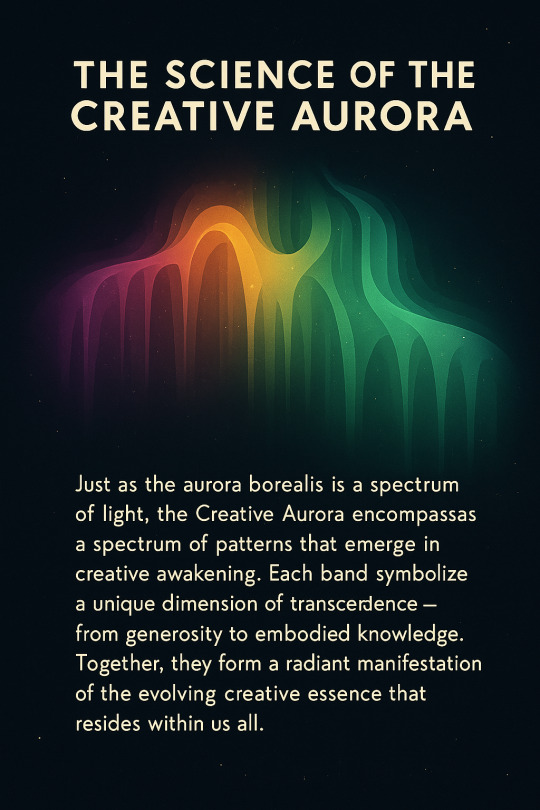
What Does a Mirror Create?
Neuroscience tells us that our brain has mirror neurons :: cells that activate when we observe something meaningful or emotionally resonant.
When you read a post that feels like it’s describing you…
When you watch a story arc that mirrors your life…
When you see art and whisper ::
“I don’t know why, but I feel that…”
That’s neuro-entrainment.
Your brain syncs with signals that match your experience :: even if you’ve never had words for it.
This is a project that did not have words until now, and I am giving voice to The Creative Åurora theoigh these arts.
Thank you for experiencing the constellation of thought. This open study into something we are all a part of :: Creativity.
#creativity#aura#creation#creating#neuroscience#live learning#design thinking#aurora#concept weaving
8 notes
·
View notes
Text
Welcome to my Blog


About Me
Minerva (but you can call me Minnie)
25
Pronouns: she/her
Manhattan, NY - - > Maryland
9/9/99
West Indian
Biology undergrad, pursuing masters in Neuro
Classical percussionist
Sorority alumnae
Aspiring polyglot
About my Blog
I have multiple blogs, but this one will be dedicated to my academic pursuits and research interests. Some topics will be:
Quotes
Linguistics
Language learning
Biology
Neuroscience
Journaling
Music
Politics
Theology
Mythology and folklore
Mathematics
Conspiracy theories
Ethics and Morals
Literature
Culture
Things I enjoy
Music
Theatre and Broadway
Art and Musuems
Food
Video games
Voice acting
Penmanship/handwriting
Fashion
Thrifting and antiquing
Libraries
Movies
Ive been on tumblr since I was a preteen but id love to shift gears and start fresh. My accounts connected to this are @mheiress9 and @minervaheiress. I’d love to have more friends and mutuals. Feel free to dm me
#about myself#academia#polyglot#langblr#language learning#books#writing#quotes#neuroscience#biology#studyblr#study motivation#study blog#studying#study aesthetic#Spotify
10 notes
·
View notes
Text
It is always wise to look ahead, but difficult to look further than you can see.— From Sense and Nonsense in Psychology by H. J. Eysenck
#Psychology#Science#Logic#Reason#Mind#Brain#Research#Evidence#Facts#Rationality#Skepticism#Thinking#Bias#Truth#Behavior#Analysis#Knowledge#Objectivity#Perception#Intelligence#Learning#Cognition#Empirical#Experiments#Neuroscience#Personality#Theories#Critique#Investigation#Understanding
7 notes
·
View notes
Text
youtube
I watch this every time I need a random maths pick me up because it’s so interesting and today I thought, if I need to write anything else research wise for school, I might just have to do it on the neurological benefits of learning chess.
#Chess#chessblr#don’t hate me for loving the queen gambit chess ppl… or do… idc because it’s gotten me excited to learn chess multiple times now#Rewatching it again as I’m able to lock in a bit more studying chess again while in classes#academia#neuroscience research#studying#Youtube
6 notes
·
View notes
Text
the absolute fucking letdown when youre excited af about something cool you found that pertains to your interests—thats like a gold mine or candy shop for you—and you try to share it with other people so they can enjoy it too, only to be met with disinterest or feeble attempts at feigning interest
#pls i just want someone to be excited about this website i found#i love neuroscience and granted im studying reptiles as the main thing#but i just found the allen institute website last night#and it has everything i could ever want#the brain maps#the cell types#the circuits#the data used for calculations and to create this thing#it has subheadings under the main titles#you can go to the anatomy atlas for humans or mice#learn about the individual cell types#find where those cells are located on the brain map#theres even one about alzheimers#theres gene sequencing#things about autism#dementia#schizophrenia#glioblastoma#tbi#neurotransmitters#microscopy#imaging#pls somebody share my excitement about this
16 notes
·
View notes
Text

Of Your Gourd
A novel self-supervised learning approach called CellSeg3D for fluorescence microscopy (whole mouse brain shown) to quantify cells in 3D volumes, such as in cleared tissue
Read the published research article here
Image from work by Cyril Achard and colleagues
Brain Mind Institute & Neuro X, École Polytechnique Fédérale de Lausanne (EPFL), Geneva, Switzerland
Image originally published with a Creative Commons Attribution 4.0 International (CC BY 4.0)
Published in eLife (reviewed preprint), September 2024
You can also follow BPoD on Instagram, Twitter and Facebook
#science#biomedicine#immunofluorescence#biology#machine learning#fluorescence microscopy#happy halloween#halloween#brain#neuroscience
10 notes
·
View notes
Text
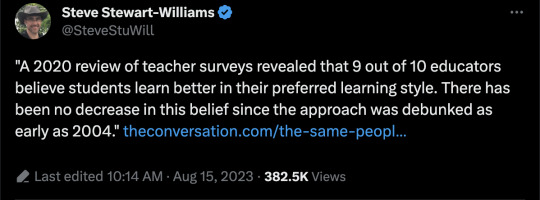
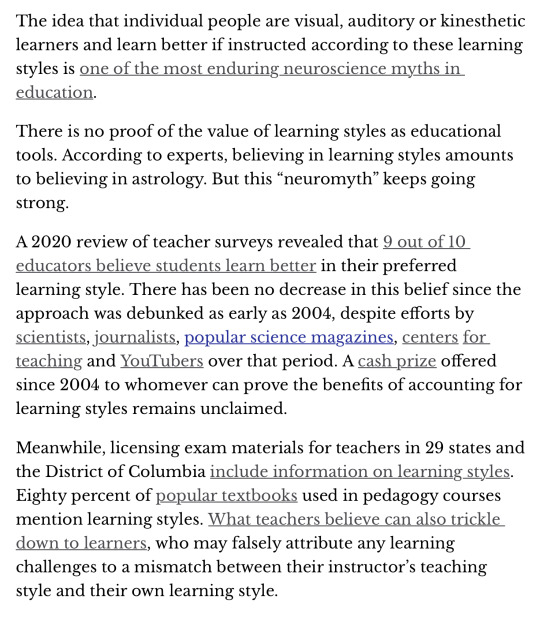
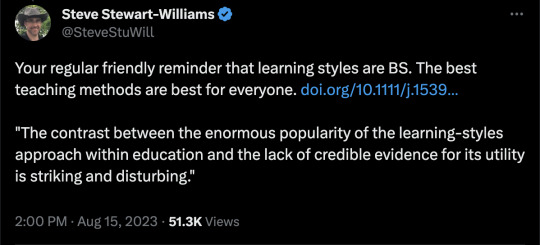
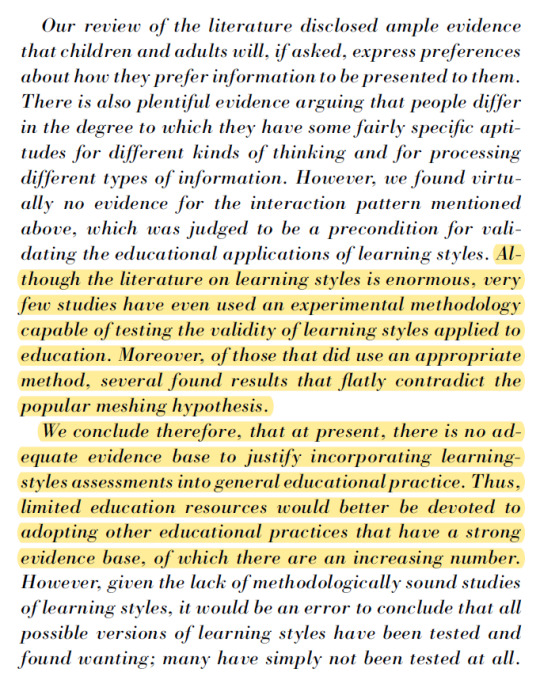
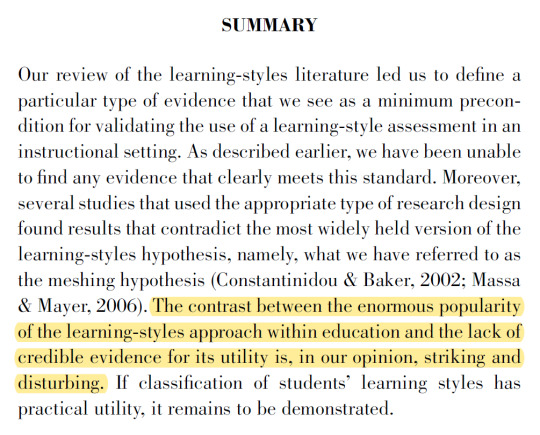
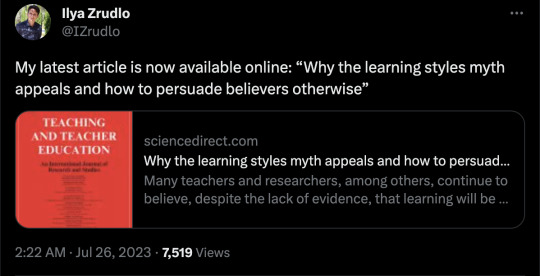
Abstract Many teachers and researchers, among others, continue to believe, despite the lack of evidence, that learning will be more effective if educators match their teaching approaches to students’ alleged learning styles. Scholars have called for more research on why the belief in learning styles is so appealing. This conceptual paper suggests four moral intuitions or sensibilities that underlie the appeal: (1) the desire for rational control, (2) our sense of justice, (3) the feeling that everyone is unique, and (4) reverence for the natural. Speaking to these intuitions could strengthen efforts to debunk the myth of learning styles in teacher education.
[..] Experts aren’t sure how the concept spread, but it might have had something to do with the self-esteem movement of the late ‘80s and early ‘90s. Everyone was special—so everyone must have a special learning style, too. Teachers told students about it in grade school. “Teachers like to think that they can reach every student, even struggling students, just by tailoring their instruction to match each student’s preferred learning format,” said Central Michigan University’s Abby Knoll, a PhD student who has studied learning styles. (Students, meanwhile, like to blame their scholastic failures on their teacher’s failure to align their teaching style with their learning style.)
Either way, “by the time we get students at college,” said the Indiana University professor Polly Husmann, “they’ve already been told ‘You’re a visual learner.’” Or aural, or what have you.
The thing is, they’re not. Or at least, a lot of evidence suggests that people aren’t really one certain kind of learner or another. In a study published last month in the journal Anatomical Sciences Education, Husmann and her colleagues had hundreds of students take the Vark questionnaire to determine what kind of learner they supposedly were. The survey then gave them some study strategies that seem like they would correlate with that learning style. Husmann found that not only did students not study in ways that seemed to reflect their learning style, those who did tailor their studying to suit their style didn’t do any better on their tests.
Husmann thinks the students had fallen into certain study habits, which, once formed, were too hard to break. Students seemed to be interested in their learning styles, but not enough to actually change their studying behavior based on them. And even if they had, it wouldn’t have mattered.
“I think as a purely reflective exercise, just to get you thinking about your study habits, [Vark] might have a benefit,” Husmann said. “But the way we’ve been categorizing these learning styles doesn’t seem to hold up.”
Another study published last year in the British Journal of Psychology found that students who preferred learning visually thought they would remember pictures better, and those who preferred learning verbally thought they’d remember words better. But those preferences had no correlation to which they actually remembered better later on—words or pictures. Essentially, all the “learning style” meant, in this case, was that the subjects liked words or pictures better, not that words or pictures worked better for their memories.
In other words, “there’s evidence that people do try to treat tasks in accordance with what they believe to be their learning style, but it doesn’t help them,” says Daniel Willingham, a psychologist at the University of Virginia. In 2015, he reviewed the literature on learning styles and concluded that “learning styles theories have not panned out.”
That same year, a Journal of Educational Psychology paper found no relationship between the study subjects’ learning-style preference (visual or auditory) and their performance on reading- or listening-comprehension tests. Instead, the visual learners performed best on all kinds of tests. Therefore, the authors concluded, teachers should stop trying to gear some lessons toward “auditory learners.” “Educators may actually be doing a disservice to auditory learners by continually accommodating their auditory learning style,” they wrote, “rather than focusing on strengthening their visual word skills.”
In our conversation, Willingham brought up another study, published in 2009, in which people who said they liked to think visually or verbally really did try to think that way: Self-proclaimed visualizers tried to create an image, and self-proclaimed verbalizers tried to form words. But, there was a rub, he said: “If you’re a visualizer and I give you pictures, you don’t remember pictures any better than anyone who says they’re verbalizer.”
This doesn’t mean everyone is equally good at every skill, of course. Really, Willingham says, people have different abilities, not styles. Some people read better than others; some people hear worse than others. But most of the tasks we encounter are only really suited to one type of learning. You can’t visualize a perfect French accent, for example.
==
Considering the sources of teacher training, Ed Schools, are extremely highly ideological, the perpetuation of this "neuromyth" is probably not an accident or misunderstanding.
These are the schools that have attached quasi-religious overtones to their preferred, but ineffective, process of teaching kids to read, and have been denying evidence-based methods for decades.
#learning styles#pseudoscience#education#corruption of education#neuroscience#myths#science#VARK#visual learner#auditory learner#reading learner#kinesthetic learner#junk science#religion is a mental illness
80 notes
·
View notes
Text
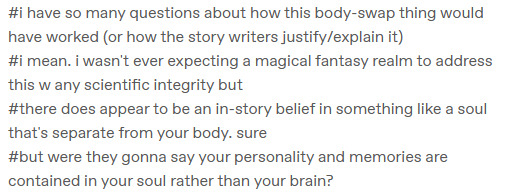
@its-leethee I felt weird reblogging my own huge post for this lmao
I'm totally willing to accept all of that without question (Christian upbringing, I guess?) but what melts my brain out my ears is if Harrow and Viren had swapped bodies, would Viren's dark magic corruption stay with his body, or with his spirit/essence?
I mean, that and "wait why does the coin spell appear to literally draw the spirit out of the body, but then the body also disappears"
#i don't actually know much about what science knows about memory and consciousness now#neuroscience or whatever#i DID learn while researching that meta that bicephaly happens because of conditions during embryonic development rather than genetics#we just don't know WHAT conditions even for reptiles and amphibians where its most common... much less mammals#but we can make tadpole embryos develop two heads by putting the eggs in a centrifuge (citation needed)#only 1 in 100000 live snakes have two heads btw
25 notes
·
View notes
Text
Just finished another class on how to not put my foot in my mouth and it's soooo validating to know people have to learn these skills like anything else. I've signed up for uhhh I think this is like my 3rd or 4th? And experts on how to not sound like a dick will school me and 30 other professionals on how to not sound like a dick. Wiiiiiiild how much there is to learn on the intricacies of communication :O
#Creepy chatter#Professionally I've been trained on the SCARF model a lot but this is the first they linked neuroscience :o#We discussed how to avoid accidentally triggering fight/flight/freeze by limiting perceived social threats#Which is sooo neat bc I've had a similar discussion w my therapist and both said essentially the same thing#Your brain DOES experience social threat/injury just like a physical threat/injury. Right down to a pain sensation.#Just like lol...being aware of that can make navigating conversations a little more understandable tbh#In F/F/F mode your brain literally does not use its logic center. We have entered unga bunga survival instincts.#Idk I have been enjoying this type of learning. Very psychology based w a focus on improving relationships :)
22 notes
·
View notes